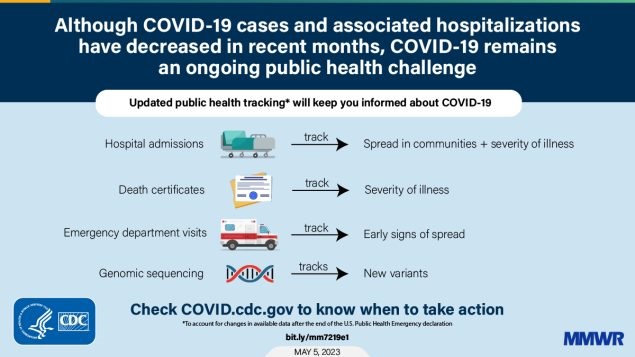COVID-19 Data
COVID-19 Data Reporting
The California COVID-19 State of Emergency ended February 28, 2023 and the federal Public Health Emergency for COVID-19 ended May 11, 2023. In response, the Centers for Disease Control and Prevention (CDC), the California Department of Public Health (CDPH), and the Fresno County Department of Public Health (FCDPH), shifted to more sustainable and meaningful public health practices and data reporting.
As a county, we are in a better place in our response, with more tools and resources to better protect the community (e.g., testing, vaccinations, treatments) and have transitioned away from the emergency phase.
COVID-19 is still a public health risk and a Public Health Department priority. The Department is still committed to COVID-19 surveillance and monitoring.
One of the bigger data changes is that aggregated COVID-19 case data dashboards will be retired. With widespread use of at-home testing, the number of cases confirmed by PCR and Point-Of-Care testing represents only a fraction of actual cases in the community. Metrics of disease severity, like hospitalizations and deaths, as well as wastewater levels of SARS-CoV-2, provide a more reliable and sustainable picture of the impact of COVID-19.
|
Case Data
|
Aggregate counts of COVID-19 cases have become less representative of actual community transmission of SARS-CoV-2 over time, related to decreased laboratory testing, increased at-home testing, changes in reporting practices, and asymptomatic infections. In the current phase of surveillance, aggregated COVID-19 case data will no longer be reported on routine dashboards or used as a primary surveillance metric.
CDC Principal Deputy Director Dr. Nirav Shah, “we will still be able to tell that it’s snowing, even though we’re no longer counting every snowflake”.
|
|
Death (Mortality) Data
|
Reporting of COVID-19 deaths will align with reporting methods similar to other communicable diseases under public health surveillance.COVID-19 death certificate data from the California Integrated Vital Records System is now used as the primary source of COVID-19 death data.
Death Data
|
|
Genomic/ Variant surveillance
|
Genomic surveillance to estimate SARS-CoV-2 circulating variants will continue at a national, regional, and state level. During the pandemic County trends have aligned with Statewide variant trends.
Variant Data
|
|
Vaccination Data
|
Vaccines remain one of the best tools to prevent severe illness, hospitalizations, and death from COVID-19. Vaccines remain easily accessible in Fresno County. Due to the plateau in Fresno County vaccination trends, the increased surveillance offered by the FCDPH COVID-19 Immunization Dashboard is no longer providing meaningful insights and will be retired. Data can still be found on State and CDC websites.
Vaccination Data
|
|
Wastewater Surveillance
|
Those with COVID-19 can shed the virus in their feces (waste), even if they don’t have symptoms. The virus can then be detected in wastewater. Wastewater surveillance acts as an early warning that COVID-19 is spreading in a community.
Wastewater Data
|
|
Hospital Reporting
|
COVID-19 associated hospital admission levels will continue to be reported as long as the data is available. However, the mandate requiring hospitals to report has expired so data is more limited.
Hospital Data
|
The websites listed above do not represent a comprehensive list of all COVID-19 resources.

Epidemiology Reports
To see additional FCDPH Epidemiology Reports and Statistics please go to the Epidemiology Program Page.
Retired Dashboards
Document Archive